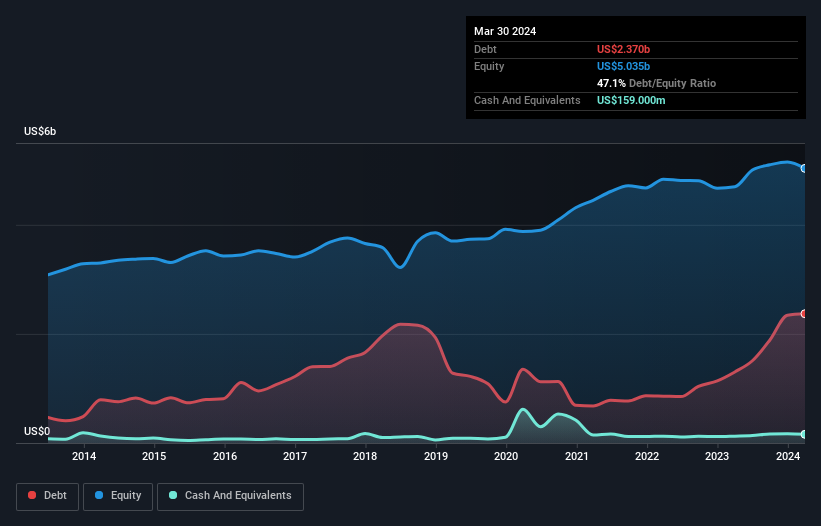- United States
- /
- Healthcare Services
- /
- NasdaqGS:HSIC
Here's Why Henry Schein (NASDAQ:HSIC) Has A Meaningful Debt Burden

Warren Buffett famously said, 'Volatility is far from synonymous with risk.' It's only natural to consider a company's balance sheet when you examine how risky it is, since debt is often involved when a business collapses. Importantly, Henry Schein, Inc. (NASDAQ:HSIC) does carry debt. But the more important question is: how much risk is that debt creating?
When Is Debt A Problem?
Generally speaking, debt only becomes a real problem when a company can't easily pay it off, either by raising capital or with its own cash flow. If things get really bad, the lenders can take control of the business. However, a more common (but still painful) scenario is that it has to raise new equity capital at a low price, thus permanently diluting shareholders. By replacing dilution, though, debt can be an extremely good tool for businesses that need capital to invest in growth at high rates of return. The first thing to do when considering how much debt a business uses is to look at its cash and debt together.
View our latest analysis for Henry Schein
How Much Debt Does Henry Schein Carry?
The image below, which you can click on for greater detail, shows that at March 2024 Henry Schein had debt of US$2.37b, up from US$1.30b in one year. On the flip side, it has US$159.0m in cash leading to net debt of about US$2.21b.

How Healthy Is Henry Schein's Balance Sheet?
According to the last reported balance sheet, Henry Schein had liabilities of US$2.33b due within 12 months, and liabilities of US$2.78b due beyond 12 months. Offsetting these obligations, it had cash of US$159.0m as well as receivables valued at US$1.64b due within 12 months. So it has liabilities totalling US$3.31b more than its cash and near-term receivables, combined.
While this might seem like a lot, it is not so bad since Henry Schein has a market capitalization of US$9.41b, and so it could probably strengthen its balance sheet by raising capital if it needed to. However, it is still worthwhile taking a close look at its ability to pay off debt.
In order to size up a company's debt relative to its earnings, we calculate its net debt divided by its earnings before interest, tax, depreciation, and amortization (EBITDA) and its earnings before interest and tax (EBIT) divided by its interest expense (its interest cover). This way, we consider both the absolute quantum of the debt, as well as the interest rates paid on it.
With a debt to EBITDA ratio of 2.4, Henry Schein uses debt artfully but responsibly. And the fact that its trailing twelve months of EBIT was 7.9 times its interest expenses harmonizes with that theme. Importantly, Henry Schein's EBIT fell a jaw-dropping 22% in the last twelve months. If that earnings trend continues then paying off its debt will be about as easy as herding cats on to a roller coaster. When analysing debt levels, the balance sheet is the obvious place to start. But it is future earnings, more than anything, that will determine Henry Schein's ability to maintain a healthy balance sheet going forward. So if you want to see what the professionals think, you might find this free report on analyst profit forecasts to be interesting.
But our final consideration is also important, because a company cannot pay debt with paper profits; it needs cold hard cash. So the logical step is to look at the proportion of that EBIT that is matched by actual free cash flow. During the last three years, Henry Schein produced sturdy free cash flow equating to 64% of its EBIT, about what we'd expect. This free cash flow puts the company in a good position to pay down debt, when appropriate.
Our View
Henry Schein's EBIT growth rate was a real negative on this analysis, although the other factors we considered cast it in a significantly better light. But on the bright side, its ability to to convert EBIT to free cash flow isn't too shabby at all. It's also worth noting that Henry Schein is in the Healthcare industry, which is often considered to be quite defensive. Looking at all the angles mentioned above, it does seem to us that Henry Schein is a somewhat risky investment as a result of its debt. That's not necessarily a bad thing, since leverage can boost returns on equity, but it is something to be aware of. There's no doubt that we learn most about debt from the balance sheet. But ultimately, every company can contain risks that exist outside of the balance sheet. These risks can be hard to spot. Every company has them, and we've spotted 2 warning signs for Henry Schein you should know about.
When all is said and done, sometimes its easier to focus on companies that don't even need debt. Readers can access a list of growth stocks with zero net debt 100% free, right now.
Valuation is complex, but we're here to simplify it.
Discover if Henry Schein might be undervalued or overvalued with our detailed analysis, featuring fair value estimates, potential risks, dividends, insider trades, and its financial condition.
Access Free AnalysisHave feedback on this article? Concerned about the content? Get in touch with us directly. Alternatively, email editorial-team (at) simplywallst.com.
This article by Simply Wall St is general in nature. We provide commentary based on historical data and analyst forecasts only using an unbiased methodology and our articles are not intended to be financial advice. It does not constitute a recommendation to buy or sell any stock, and does not take account of your objectives, or your financial situation. We aim to bring you long-term focused analysis driven by fundamental data. Note that our analysis may not factor in the latest price-sensitive company announcements or qualitative material. Simply Wall St has no position in any stocks mentioned.
About NasdaqGS:HSIC
Henry Schein
Provides health care products and services to office-based dental and medical practitioners, and alternate sites of care worldwide.
Undervalued with adequate balance sheet.


